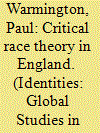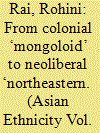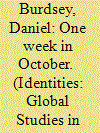|
|
|
Sort Order |
|
|
|
Items / Page
|
|
|
|
|
|
|
| Srl | Item |
| 1 |
ID:
174601


|
|
|
|
|
| Summary/Abstract |
Drawing on interviews with thirty-two black British professionals, and ethnographic work in middle-class cultural spaces across London, this paper asks ‘How do the black middle-class use cultural consumption for anti-racism?’ I argue that the black middle-class contest the racial hierarchy at three levels through their cultural consumption: the material, the ideological, and the symbolic. At the material level, black middle-class people consume cultural forms they decode as ‘white’ in order to establish an equity with whites in levels of cultural capital. At the ideological level, black middle-class people consume cultural forms that uplift meanings and representations of blackness, thus challenging controlling images of blackness. Lastly, at the symbolic level, black middle-class folks create and sustain cultural spaces where black people’s cultural and symbolic knowledge is given proper recognition and authority.
|
|
|
|
|
|
|
|
|
|
|
|
|
|
|
|
| 2 |
ID:
174037


|
|
|
|
|
| Summary/Abstract |
This paper examines the development of Critical Race Theory (CRT) in England, in terms of impact and opposition. Since the early 2000s CRT has become a significant intellectual space for race-conscious scholars and activists in England. The current paper traces the growth of CRT in the field of education (where it has had the greatest impact since its arrival). It identifies the academic research, writing, networks and events that have established CRT in England. It discusses the substantive concerns of English CRT and how these are both similar to and distinct from CRT as developed in the USA. In England, CRT has also met with opposition. This paper examines the discourses of derision voiced by its antagonists, arguing that much of this antagonism has an atavistic quality, being rooted in long-standing antipathy towards race-conscious social analyses.
|
|
|
|
|
|
|
|
|
|
|
|
|
|
|
|
| 3 |
ID:
185497


|
|
|
|
|
| Summary/Abstract |
Contemporary India has witnessed a rise in racism discourse, central to which are people from North-East and Himalayan regions, collectively referred to as ‘Northeasterns’. This has recentred ‘race’ and racism as being a theoretical-political problem of contemporary India itself. However, existing literature shows that there is stark under-theorisation of ‘race’ and racism in Indian context. Drawing from ethnographic research and applying the racialization approach, this paper argues that ‘race’ in India is a postcolonial-neoliberal construct, whereby colonial ‘Mongoloid’ is reconstructed into neoliberal ‘Northeastern’, such that ‘race’ in India acts as a layered mode of constructing identity and difference. It further argues that the ‘Northeastern’ category emerges as a result of exclusion from the ‘Indian’ category, which itself is racialized along Hinduised-Aryanised lines, such that racism is a product of a postcolonial centre-periphery power-relation between India and its North-East; thereby making way for critical ‘race’ scholarship in the Indian context.
|
|
|
|
|
|
|
|
|
|
|
|
|
|
|
|
| 4 |
ID:
119386


|
|
|
|
|
| Publication |
2013.
|
| Summary/Abstract |
This article addresses the potential that a kind of engaged research can have in current battles for social justice and in the transformation of college curricula as a way to recover the original critical spirit of ethnic studies. Building on critical race theory, I discuss the work of NGOs such as Human Rights First and Americans for Immigrant Justice on behalf of Haitian refugees and the role of literature in inspiring human rights actions that might redefine practices of citizenship and belonging. At a time when the United States recognises the rights of refugees but criminalises the search for asylum, coalition building between ethnic studies discourse, the legal academy and the community is vital to affirm and protect the internationally recognised rights of refugees. Crucial in this process is the role played by stories as a way to humanise the often impersonal topic of the immigration debate.
|
|
|
|
|
|
|
|
|
|
|
|
|
|
|
|
| 5 |
ID:
133825


|
|
|
|
|
| Publication |
2014.
|
| Summary/Abstract |
This article explores two significant incidents of racism - involving Luis Suárez and John Terry - from the 2011-2012 English Premier League football season. In particular, it analyses and contextualises the reactions and responses articulated by key stakeholders within the football industry. Discursive themes were employed by these individuals as a means of trying to mitigate and/or exonerate the actions of Suárez and Terry, to question the veracity of the allegations made against them, and to downplay the extent and effects of racism in English football more generally. The article situates these standpoints within the wider cultural politics of race in the game and extricates the connections between discourse and structure in manifestations of racism. It demonstrates that these dominant responses are indicative of colour-blind ideology, white racial framing and the rules of racial standing. It also argues that these sporting trends are part of a wider societal shift towards racial neoliberalism.
|
|
|
|
|
|
|
|
|
|
|
|
|
|
|
|
| 6 |
ID:
167652


|
|
|
|
|
| Summary/Abstract |
This article revisits Critical Race Theory and brings it’s explanatory capacity to bear on the contemporary racialization of Muslims in Europe, most specifically the experience of British Muslim communities in education. The article argues that CRT can provide a theoretically fruitful means of gauging the ways in which anti-Muslim discrimination might be engendered through various strategies around securitization. In a social and political context characterized by a hyper-vigilance of Muslim educators in particular, the article concludes that applying CRT allows us to explore how a general latent whiteness is given political content through a particular racialization of Muslims.
|
|
|
|
|
|
|
|
|
|
|
|
|
|
|
|
| 7 |
ID:
168186


|
|
|
|
|
| Summary/Abstract |
This article revisits Critical Race Theory and brings it’s explanatory capacity to bear on the contemporary racialization of Muslims in Europe, most specifically the experience of British Muslim communities in education. The article argues that CRT can provide a theoretically fruitful means of gauging the ways in which anti-Muslim discrimination might be engendered through various strategies around securitization. In a social and political context characterized by a hyper-vigilance of Muslim educators in particular, the article concludes that applying CRT allows us to explore how a general latent whiteness is given political content through a particular racialization of Muslims.
|
|
|
|
|
|
|
|
|
|
|
|
|
|
|
|
| 8 |
ID:
175369


|
|
|
|
|
| Summary/Abstract |
This article provides a re-theorization of the Prevent strategy as racialized bordering. It explores how knowledge regarding the racist logics of British counter-terrorism are supressed through structures of white ignorance and how International Relations scholarship is implicated in this tendency to ‘whitewash’ Prevent’s racism. Building on the use of science fiction in International Relations, the article uses China Miéville’s novel The City and the City to undertake the analysis. Miéville evokes a world where the cities of Ul Qoma and Besźel occupy the same physical space but are distinct sovereign jurisdictions. Citizens are disciplined to ‘see’ their city and ‘unsee’ the other city to produce borders between the two. The themes of coding signifiers of difference and seeing/unseeing as bordering practices are used to explore how Prevent racializes Muslims as outsiders to a white Britain in need of defending. Muslim difference is hypervisibilized or seen as potentially threatening and coded as part of racialized symptoms which constitute radicalization and extremism. This article shows how the racial bordering of Prevent sustains violence perpetrated by white supremacists, which is subsequently ‘unseen’ through the case of Thomas Mair.
|
|
|
|
|
|
|
|
|
|
|
|
|
|
|
|
| 9 |
ID:
187162


|
|
|
|
|
| Summary/Abstract |
This article analyzes a Taiwanese learning experience about the U.S. Civil Rights Movement, launching an educational project with 18 Taiwanese high school students to discuss their understanding of race, racism, and social justice. The rationale of analyzing the student participants’ comments rests on critical race theory. After analysis, this study found that Han ethnocentrism functions as a hidden identity and value system to influence the student participants to respond to racial issues. Han ethnocentrism caused the participants focusing on the racial experiences in Han groups and narrowed their understandings to the world. However, the result of this research also indicated that with a proper introduction, participants were willing and capable of developing racial sensitivity and affirmative attitudes about social justice toward minorities in Taiwan, such as Taiwanese Aboriginals and Southeast Asian migrant workers.
|
|
|
|
|
|
|
|
|
|
|
|
|
|
|
|
|
|
|
|
|